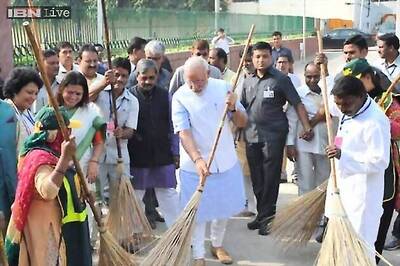
views
Online gaming is a social challenge and a regulatory nightmare and this complexity is further increased by the lobbying by well-funded companies willing to bend the law. This has created an environment where the government system is being compromised. While the tax authorities have taken a clear stance on these platforms, the operating Ministry is still to frame regulations for governing them.
The Ministry of Electronics & Information Technology (MeitY), the operating Ministry for online gaming, has recently decided that it won’t go the SRO way for regulating this sector. CIPP has long argued that self-regulatory organisations (SROs) can only be formed after regulations for the sector are formed. If there are no regulations and no norms, what will an SRO do in terms of self-regulation. Their only role will be lobbying the government. Moreover, till such time the fundamental impact of these games is not understood by policymakers, regulations cannot be devised based on just industry inputs.
Two components are intertwined in online gaming, one is the addictive nature of these games and the second is the use of money in these games. A false narrative is being created that gamers can earn a living by playing online games, which is closer to saying gamblers can make a living from casinos. There is a talk of including these online games in the Olympic games to ensure that this narrative remains alive. There are championships sponsored by online gaming companies to ensure attractive prize money to support this narrative. Young adults are telling their parents that they are learning a skill and not wasting their time in dopamine-soaked dumps of human attention.
While a GST has been levied on every transaction made on these platforms, the more important issue is to control the addiction and attention grabbed by these games. An attention-based tax is needed to control the time spent by individuals on these platforms.
India can be the first country to address online addiction by introducing attention-based taxation which will prevent these platforms from creating algorithms that prey on the human mind. The quicker the government moves on it, the better it is as with time, the lobbying power of these platforms will only increase. They should not become a menace like social media platforms.
Social media companies misused the ‘freedom of expression’ ploy to avoid regulatory constraints. They built platforms that have destroyed traditional media, created echo chambers of disinformation, and weakened democratic institutions including elections. Now, we are witnessing online games use skill, earning, jobs, and economic arguments to justify their presence. Let’s really break this argument down so that policymakers and government do not walk the same garden path as they did by creating the monster of social media platforms.
The skills argument is that online gaming is a game of skill and players are learning something every day while they sit on their high-performance computing machines twiddling their thumbs while pressing the same key incessantly for hours. The argument is that they are teaching crucial skills like strategic thinking, planning, and working to users and hence they are games of skills and not games of chance. This argument has been denied by the tax authorities while levying the highest form of GST on them but MeitY, the operating Ministry, has not addressed this issue. The fact is that there is no skill to learn from most of these games.
The top ten online games are free and their business model is based on how long can they keep the users locked so that they can sell them stuff inside the game. Indian online gaming companies have taken this model one step ahead, they have added prize money. Which allows the users to register for a fee in a game where there is a purse made up of registration fees collected from the users themselves. They may give it different names like build your own cricket team and link it to the outcome of how it performs with other teams or in fact even the outcome of a T20 match, but it is gambling and it is addictive. Unfortunately, these gambling games are hiding behind the thin veneer of online gaming. Very similar to how disinformation is hiding on social media platforms. Disinformation and misinformation spread much faster and are more addictive hence they proliferate on social media platforms.
The irony is that winning the prize money is cited as a way for users to earn a living. The other argument is that there has been a lot of funding invested in these online companies and they are building an industry in India. This industry will offer jobs and add to the economic growth of the country hence it should not be taxed or treated like an addictive gambling play. If it is treated like one the industry will migrate away to offshore tax havens and continue to operate.
This is a bad argument. Will a country allow a producer of banned substances like fentanyl to manufacture? The fentanyl manufacturers are also creating jobs, have investors, and can say that is adding to economic growth. Will Indian regulators not regulate it because of this argument that it will take its plant overseas if Fentanyl is treated as a banned substance? Online games are no different in terms of addiction than being addicted to Fentanyl or cocaine.
Online games need to be banned, but if that sounds too extreme, let us begin by taxing them on the amount of attention that they are sucking. Every manhour of attention that is sucked by an online game is not invested in productive activity by the individual. The cost of total manhours spent by users multiplied by the cost of each manhour is the minimum amount that an online game should pay the government. This will force online games to reduce the total time spent on the game by individuals and hopefully, they will change their algorithms to reduce the addictive nature of these games. China has rules that ban online games on school days or during the exam season to prevent students’ attention from being lured away.
The link between online addiction and deterioration in mental health is well established. The rapid fall in the mental health of Generation Z is also well documented. Generation Z (Gen Z) is currently between 10 and 25 years old, born between 1997 and 2012, and research suggests that they are the most anxious generation to date. While they have several stressors in their life, online gaming addiction can easily be prevented by some wise intervention.
Therefore, an attention-based tax that is incorporated into regulations should be issued by the MeitY and followed by an SRO to ensure that it is followed in practice.
K Yatish Rajawat is a public policy researcher and works at the Gurgaon-based think and do tank Centre for Innovation in Public Policy (CIPP). Views expressed in the above piece are personal and solely that of the author. They do not necessarily reflect News18’s views.



















Comments
0 comment